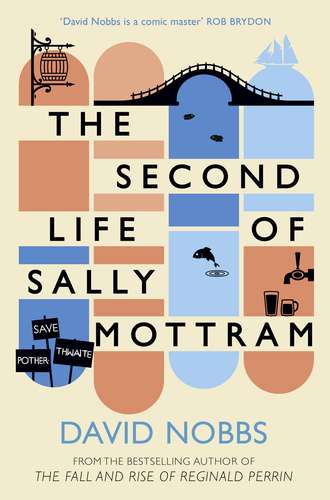
Полная версия
The Second Life of Sally Mottram
Frank and his wife Marian greeted Marigold warmly.
‘So sorry about …’ began Frank nervously.
Marigold waved her arms in a negative gesture.
‘Good riddance,’ she said. ‘Past history.’
‘Thank you anyway for all your support,’ said Marian.
‘I’ve no idea what’ll happen this year,’ said Marigold.
‘No matter,’ said Frank. ‘You’re always welcome here.’
‘Nonsense, but nice to hear,’ said Marigold. ‘And I’m so sorry I’m so late.’
‘You’ve missed my speech,’ said Frank.
‘She heard it last year,’ said Marian. ‘Only two words were different, Marigold.’
Marigold laughed dutifully.
‘Go and get yourself a drink,’ said Frank. It was an abrupt but attractive dismissal. She longed for a drink.
She accepted a glass of champagne and a mini Yorkshire pudding from smiling waitresses. One or two people were already leaving. She really was much too late. And it wasn’t as crowded as usual. The town was on a slide. She wouldn’t stay long – here at the party, or in Potherthwaite.
She looked around the room, searching for women she knew and liked. Searching particularly for Sally. There were women in the town whom she liked but didn’t much trust, and there were women whom she trusted but didn’t much like, but Sally was the only woman whom she liked and trusted, of those she knew well enough to approach.
She was lost, lost on her own, lost without her other half, lost in the world, and seeking comfort from other women, not from men. This was a huge shock.
She found herself walking past Terence and Felicity Porchester, who lived on the stranded narrowboat.
‘Hello, Marigold,’ said Terence Porchester in his posh, fruity tones. ‘You grow more gorgeous with every passing month.’
‘I’m green with envy,’ said Felicity in her matching voice. In plain-speaking Potherthwaite their voices had been much mocked, but slowly people had begun to realize that there wasn’t an evil bone in either of their bodies.
‘Where is that naughty man of yours hiding tonight?’ asked Felicity.
‘I’ve no idea,’ said Marigold. ‘At the bottom of the canal, I hope.’
She strode on, realized that she had been rudely abrupt, began to turn to apologize, found herself facing Matt Winkle, the supermarket manager, sallow, callow, anxious, fractious.
‘Bloody woman,’ he said. ‘Here. Now. Tonight. What a time. At a party.’
‘What a time for what?’ asked the bemused Marigold.
‘Complaining our apples aren’t ripe. Bloody woman. Linda Oughtibridge. Sorry.’
Marigold turned away, found herself approaching two more men she didn’t want to speak to. Gunter Mulhausen was German and formal and not very exciting, and he pretended to be in love with her, in a rather heavy Teutonic way, and she wasn’t sure she was up to the jovial little fantasy today. Bill Etching was a randy little tosser who was regrettably successful in business and generous in charity. He was a worm who wormed himself in with his money. Timothy had joked that his surname was unfortunate. No woman would want to go back to look at his etchings.
She couldn’t cope. Where was Sally? She would have said, ‘Excuse me, chaps, lovely to see you, but I have something to discuss with Sally.’ She couldn’t see any woman whose name she remembered, apart from Marian and Felicity, so there was no woman she could use as an excuse. She had always liked men. She had been a man’s woman. Now all these men frightened her. Now she couldn’t cope with men. She couldn’t even remember their names. All names were fleeing from her. She began to perspire. She had never perspired. She hadn’t even glistened.
She saw a man she recognized approaching Frank What’s-his-name. Frank led him straight out of the room. He was a policeman. Inspector … Inspector … Punnet. Not Punnet but like Punnet. What had Inspector Not Punnet But Like Punnet wanted? She heard Tommy What’s-it, landlord of the Dog and Duck, say to her, ‘I hope you’ll still come to the pub, Marigold. We’ll look after you.’
‘I’m sure you will,’ she said. ‘Yes, I’ll come.’ His name had gone too.
‘Now maybe one day that dinner invitation may be meeting with success very possibly,’ said Gunter Mulhausen.
The thought of dinner with the smiling Teuton appalled her.
Pellet. Inspector Pellet.
What did he want?
‘I would love dinner some time,’ she told Gunter Mulhausen.
Pork Scratching’s filthy little hand touched her bum. She felt it distinctly. Not Pork Scratching. Not come and see my scratchings. Come and see my etchings. Bill Etching, that was it.
She had to move. She couldn’t. She was stuck to the carpet. She couldn’t be. Walk, woman.
‘Are you all right?’ asked Tommy Allsop, his name suddenly recalled.
‘Hold my arm. Hold my arm,’ said Gunter Mulhausen.
Bill Etching clutched her waist.
‘Don’t touch me,’ she shouted.
Everyone looked round. Everyone was staring at her. Such a shout had never been heard at one of Councillor Stratton’s parties.
The men let go rapidly. All three looked embarrassed, even Bill Etching.
Again she tried to walk. She couldn’t balance on her high heels, she was falling, it was all going black, her head was whirring, she felt a hand on her, trying to break her fall, and then she felt nothing more.
All sorts of people rushed over. Gunter Mulhausen rang 999. Tommy Allsop hurried over to Marian Stratton and asked where Frank was. She pointed towards their kitchen.
Frank Stratton was sitting at the breakfast table. He was white with shock. He had just heard of Barry’s suicide. Tommy approached but was surprised and shocked by Frank’s appearance, and hesitated.
‘Oh God,’ Frank was saying. ‘I didn’t invite him. He didn’t give or come to anything this year. Didn’t even hear from him, which I have to say annoyed me, which is why I didn’t invite him. A nice chap once, but he’s gone off. He has. He’s gone off. And now this. Oh God. Poor Sally. I’ve a lot of time for Sally. Tommy, what is it? If it’s about Barry Mottram, we’ve heard.’
‘It isn’t. Barry Mottram? No, it’s Marigold. She’s fainted.’
‘Oh God,’ said Councillor Frank Stratton. ‘What an evening. That puts the tin lid on it. You know, I think this town is in danger of being officially declared a disaster area.’
EIGHT
Ben arrives home late
Night was folding Potherthwaite in its grip. The girl with the golden hair and Dr Mallet’s vase must hurry. Soon Inspector Pellet would be back from his function. To get on to the roof of the garage was child’s play – and she had forgotten that she was still a child. It was easy too to shin up the drainpipe, even with that great big delicate vase in her hand. It was hard to imagine that she had the strength, this slip of a girl, to open still further the upstairs window that hadn’t quite been closed (and him a policeman and involved in Neighbourhood Watch!). She didn’t need to open the window very far. She was so slim. The rest was easy: slip in, place the vase in full, challenging view on the dressing table in the scene of the Pellet lovemaking, ugh, the thought, slip out, leave the window open, slide down, disappear into the night, he’d never trace her, the stupid clod, he’d look ridiculous, ha ha, job done.
It was not yet half past eleven when the driver employed part-time by the council took a very subdued Marigold Boyce-Willoughby home to the cul-de-sac. The lights were on in number 9, where unpacking was still taking place, and the cocoa had not yet even been put on. The lights were still on in number 11 too. Jill was taking off her make-up, and Arnold was just putting the finishing touches to chapter 77, ‘The High Street Suffers in the Era of Rationing’.
It was in fact twenty-seven minutes past eleven when she arrived home, and there was still no sign of that strange boy Ben Wardle at the Wardle home in Pomfret Crescent.
Marigold had soon come round after her panic attack, but she had flatly refused to go to the hospital. Her remark, ‘They come out of there feet first,’ had not gone down well with the doctors and nurses who had been rewarded for their generosity by being invited to the party. Councillor Stratton had pointed out that it was obvious that Marigold was unwell and was spouting careless gibberish in her embarrassment and shame. He would see that the hospital got a written apology from her asap.
Marigold had said that she felt perfectly all right now – it was just the stress of recent days, coupled with the heat of the room, that had made her faint. The only place in the world she wanted to be was in her own home. Councillor Stratton’s secretary, fairly high on champagne, had been forced to type a report stating that Marigold had been offered an ambulance to take her to the hospital, and had refused, and that she knowingly accepted responsibility for any unfortunate consequences that might possibly occur as a result of her decision. Marigold was hurt by this, contemplated refusing to sign the description of her refusal, then suddenly couldn’t be bothered and signed without protest, at exactly the same moment that, in Ellie’s bedroom, Sally Mottram stood up, making the first move in what might well be a lengthy departure.
Sally didn’t want to leave. She was terrified of entering her empty house. Ellie didn’t want her to leave. She dreaded every night. But there is a convention in social life. You just don’t call round uninvited, and stay till two in the morning. Leave she must.
By twenty to twelve she had reached almost to the front door of Ellie’s house, and the girl with the golden hair had arrived home, had slipped in silently, had tiptoed through the door of the lounge, where her mother had fallen asleep in her chair, as she did most nights, and was snoring her head off and inhaling the alcoholic fumes of her own breath. The girl was asleep within five minutes.
Ben’s father felt far from sleep. He was sitting at the kitchen table in his dressing gown, scowling, when Ben arrived home at last.
‘What time do you call this?’ his father demanded.
‘Eric,’ said Ben.
‘What?’
‘I call this time Eric,’ said Ben. ‘Though of course time is moving on, and it’s no longer Eric. Aren’t you going to ask me what it is now?’
‘No, I am not.’
‘It’s now Eric plus one.’
‘Well, I call it late.’
‘Pretty dull name, Dad, to be absolutely frank.’
‘I do my best with you, Ben.’
‘I agree. I think sometimes I’m infuriatingly infantile, to be honest. But I’ll grow up, Dad, sadly. And I don’t happen to think I’m remotely late. I am sixteen, you know. You’re so out of touch, Dad.’
‘It’s school tomorrow.’
‘School’s crap.’
‘So what have you been up to?’
‘I don’t see why I should tell you, but it’s true, you do do your best with me, so I will. Nothing. Sod all. No clubs. No films. No alcohol. No drugs. Nothing to eat.’
‘And where have you not done all this?’
‘In the allotments.’
‘The allotments?’
‘Yeah. It’s nice there.’
‘It’s cold.’
‘Yeah. Cool. We’re all obsessed with cool, aren’t we?’
‘Why is it nice in the allotments, Ben?’
‘Because it’s dark, so you can’t see Potherthwaite.’
‘You love running Potherthwaite down, don’t you?’
‘I don’t actually. I don’t enjoy it at all. I bitterly regret that I wasn’t born in a beautiful cathedral city with lovely old houses, a thriving arts scene, a Premier League football team and a beautiful estuary leading out to a warm southern sea.’
‘Better do something about it then, hadn’t you?’
‘Maybe I will. Maybe I just will.’
‘So what have you done all evening in the allotments?’
‘I’ve told you. Nothing.’
‘You must have done something.’
‘Well, yeah. Talked. About nothing, though.’
‘So you weren’t alone.’
‘Sharp, Dad. Very sharp.’
‘Don’t patronize me. We feed you, we look after you. We don’t deserve to be patronized.’
Ben actually looked shamefaced.
‘Sorry.’
There was a brief pause. Tick-tock of the kitchen clock, which was slightly askew – the cleaner had been.
‘Who were you with?’
‘Tricksy.’
His father tried so hard not to make any noise, but the very faintest sigh emerged from his mouth. Or his nose. Ben wasn’t quite sure where sighs did come from.
His parents didn’t like Tricksy. He knew that they wondered if he and Tricksy … did things together. On allotments. At night. They believed in equal marriage, although they couldn’t really think it was worth all the time and money the House of Commons had taken up with it when the sea would boil in twenty years and the oil would run out next Thursday and seven million illegal immigrants were arriving at Dover every three days – Ben’s dad was given to exaggeration. Ben had once told his dad that he exaggerated 367 times a week, and his dad hadn’t seen the joke.
They were enlightened people, but they didn’t want Ben to be gay. For his own sake, you understand. Mind you, it wasn’t just that. They didn’t even know if he was gay. They didn’t know if Tricksy was gay. They would just have been happier if their only child was showing signs of having more than one friend.
Ben had heard the sigh and it made him very angry. Earlier, when he’d been teasing his dad, it had been all right, but now, over Tricksy, he couldn’t tease. He could explode, or go to bed. He made a surprisingly sensible choice.
‘Right. I’m off. It’s bedtime.’
‘It’s past bedtime.’
‘Whose fault is that? You’ve kept me talking.’
‘Point taken. Guilty as charged.’
His dad suddenly smiled. It was entirely unexpected, and it threw Ben. He turned at the door, and said something he hadn’t said for several years, and had had no intention of saying that night.
‘Love you, Dad.’
He wished he hadn’t said this. Saying it shocked him. He realized that it was no longer true.
It was three minutes past twelve as Ben set off upstairs. Sally Mottram hadn’t reached home yet. She didn’t want to reach home. She was walking increasingly slowly along Oxford Road. There were no lights on in Dr Mallet’s, no lights on at the Sparlings’, no lights on at the Hammonds’, no lights on in Oxford Road. The council had recently started to switch the lights off at midnight, perhaps so that murderers couldn’t see their victims well enough to stab them or shoot them accurately enough to kill them.
Sally opened the gate, walked slowly up the path beside the lawn, put her key in the lock, turned it, opened the door, went in, and closed the door carefully from long habit, so as not to wake anyone, although there was no longer anyone to wake.
She decided to go straight upstairs, get it over. She didn’t know how she would find the courage to walk past where he had been. But she had to. She had to start.
She climbed the stairs at a steady pace, quaking but resolute. She tried not to look, but she had to take a quick peek, and there he … wasn’t.
She crossed the landing, opened the bedroom door, went in, and closed it.
She thought back to the strange words that she had thought to herself at the bottom of the stairs. ‘You have to start.’ What had she meant? Start what? She had no idea what she had to start. Just to live the rest of her life? Just to survive?
Or something more?
NINE
Going south
The taxi had been late, and she had arrived at Potherthwaite station just in time to see the 10.22 snaking round the corner towards a better world.
Six weeks had passed since Sally Mottram had made that horrendous discovery at the top of the stairs. For six weeks there had grown in her an overwhelming desire to leave Potherthwaite, to go back down south. At times her desire had been to leave not just Potherthwaite, but this world. She didn’t see any point in her living any more. Her children were settled and didn’t need her. Her life was pointless.
She wheeled her suitcases along platform 1, past baskets of dull, neglected flowers. She passed the steps that led on to the footbridge, and pressed for the lift. The lift arrived with a sigh, as if utterly tired of its tiny routine. The doors opened. It was quite a job to get her two cases into the lift. They were too large. She had brought too much stuff. She hadn’t been capable of deciding what not to bring. She was no longer capable of making decisions.
‘Going up,’ said the voice of a surprisingly posh woman, bossily and unnecessarily since there was nowhere to go but up. The lift rose to footbridge level like an asthmatic old man on his last legs.
‘Footbridge level,’ thundered the bossy woman with just a hint of pride at the lift’s achievement.
It was now quite a job to get the two cases out of the lift. Sally wheeled them halfway across the footbridge and stopped for breath.
The railway line runs along the bottom of Baggit Moor and is therefore slightly above the level of the valley floor. As she stood there, Sally could see the town spread out before her. Grey stone buildings, grey slate roofs. She could even see back to Oxford Road, though it was impossible from this distance to single out ‘The Larches’. What a feeling it had been, that morning, to walk out of the front door and know that she wouldn’t have to pass the top of the stairs for at least two weeks, maybe longer, depending on how she got on with Judith. And of course she was far too far away, here on the footbridge, to see the ‘For Sale’ sign.
Everybody said it was good that she was selling. She would never quite get over the shock, if she stayed. Everybody also knew that she was having to sell. She had no money.
She’d overheard Gordon Hendrie, in the supermarket, near the rather sad fish counter – she hated fish counters, all those dead eyes – she’d heard him say, in his idea of a low voice, ‘It’ll have been because of sex or money. It always is.’ She’d known that he had been talking about Barry.
She’d hoped that it had been because of money, which was absurd, because if it was money she would live the rest of her life in poverty. But if it was because of sex she would have shared her marital bed with a monster, kissed a pervert, been made love to by a dirty dirty man, and that would have been even worse than poverty.
It had been money. Mottram & Caldwell had been struggling. There weren’t so many people in Potherthwaite who had been able to afford lawyers’ fees. Tom Caldwell had handled his money sensibly. Barry, that precise sober lawyer, had gambled, and gambled badly on both money and horses. A lad who was on the dole had been pleased enough to get a bit of pocket money to put his bets on for him. Barry Mottram himself had never been seen in William Hill.
Much of this had been revealed at the inquest. The truth had hurt her. The fact that she had known nothing about any of it had hurt her more.
Dr Mallet, who wished that he had changed his name to something more befitting a psychoanalyst – Bronovsky, perhaps – had been persuaded to give evidence too, reluctantly, because the fact that Barry had killed himself had not been a good advertisement for a psychiatrist who had been treating the man for depression. This news too had hurt Sally. The fact that she had also known nothing about this had hurt her more. Not only had she known nothing of these things, but no suicide note had ever been found. That hurt her most of all.
Despite the lack of a note, there had been no difficulty in reaching the verdict that Barry Mottram had killed himself.
She could just see the roof of the building that housed Mottram & Caldwell. Her eyes passed on, drawn instinctively towards the uniform rooftops of Cadwallader Road. She saw, vividly, Ellie Fazackerly stuck there in her great bed.
‘Having a quiet moment?’
‘Sorry?’
‘I said, “Having a quiet moment?”’
‘I was, yes.’
‘Good for you.’
Sally stole a quick look at the speaker of these words. A middle-aged man was standing close to her, too close to her. He had sunken eyes, hollow cheeks, receding hair and an ominous long raincoat.
‘Does you good, sometimes, dun’t it?’ he said. ‘Stop. Listen. Have a think. Does you good.’
‘Yes. Yes. It does. Yes. A moment of reflection.’
‘In this hectic world.’
‘Quite.’
‘I think we may have met before.’
‘I don’t think so.’
She backed away from the man ever so slightly. But he noticed and moved closer ever so slightly.
‘Not a bad view, is it?’
Yes, it is. Can’t say that. Can’t be rude.
Why not be rude? He’s invading my space.
‘Not bad, no.’
‘No, there’s nowt like a spot of quiet thinking. Young folk don’t know how to do it. That’s what’s wrong wi’ t’world. Thinking. It’s a lost art.’
For you it is.
Couldn’t say it.
‘Very true.’
Oh God, Sally.
‘I’m on me own, you see. Me wife died twenty-two years ago.’
Suicide, was it? Sally! You are not nice.
‘I still talk to her.’
Suddenly Sally felt a wave of sympathy for the man in the long raincoat.
‘I can understand that.’
‘You get lonely, you see.’
‘Yes. Yes, I do see.’
There was silence for a moment. Sally found that she couldn’t just leave, not after that information. Somehow, it had become an important moment, here on the footbridge, teased by a playful easterly breeze.
‘As I say … you don’t mind my talking, do you? Cos I know I interrupted you thinking.’
‘You can think too much.’
‘I pride meself on knowing when to talk and when not to talk. I was a taxi driver, see. Tool of the trade, is that. Gauge when the passenger wants to talk, gauge when he wants to be quiet. Tool of the trade.’
I’m rather glad I never hired your taxi.
‘I bet you’re glad you never hired my taxi.’
‘No!’
She didn’t want to move on until he did. But he showed no sign of going. It was an impasse. Maybe they would stay on the footbridge for ever.
‘I’m sorry.’
‘What for?’
‘Interrupting you. When you were thinking.’
‘It doesn’t matter.’
‘It does. I’ve let meself down. I’ll be off now.’
Don’t say anything, Sally.
‘Leave you with your thoughts. And the view.’
‘Thank you.’
‘Not a bad old place. Bit of a dump, I suppose, but what somebody could do with it! What somebody could do with it, eh?’
‘Absolutely. Very true. Well, it’s been nice talking to you.’
Even he should take that hint, but she held out her hand to make the point even more positively.
They shook hands. She’d have time to wash hers before she had anything to eat.
He moved off. She was ashamed of the depth of her relief.
He was coming back!
‘I remember where I saw you.’
‘Oh?’
‘Coming out o’ kirk t’other Wednesday. I know it was Wednesday cos it wasn’t market day and I’d thought it was, silly me. You and your daughter. Pretty girl. I could see the resemblance. Lovely couple you made, if you don’t mind my saying.’
‘No. Not at all. Not at all. It was my husband’s funeral.’
‘Oh no. I’ve done it again. I’m so sorry.’
‘It’s all right, but …’
‘You want to cry. I understand. And I agree. Don’t hold it in. That’s trouble wi’ Potherthwaite. We hold too much in. Let it all out, I say.’
Long Raincoat moved away, and this time he didn’t turn back. Sally looked out over the grey town, and thought about his words. ‘Bit of a dump, I suppose, but what somebody could do with it!’ She shook her head at the impossibility, the absurdity of the sudden thought.
She looked over at the church. She thought of herself and Alice as Long Raincoat must have seen them. A lovely couple. Yes, they must have looked a lovely couple.







